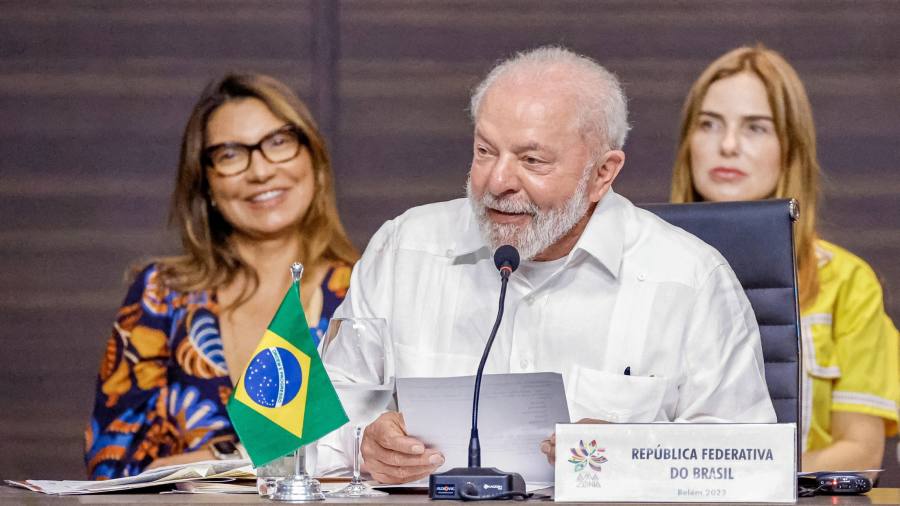Receive free Deforestation updates
We’ll send you a myFT Daily Digest email rounding up the latest Deforestation news every morning.
The leaders of Amazonian nations failed to agree a joint target on ending illegal deforestation as they concluded a key summit in Brazil about the future of the rainforest vital to the earth’s climate.
The outcome of the gathering led by Brazilian president Luiz Inácio Lula da Silva disappointed activists and indigenous groups, and dealt a blow to Lula’s ambition to persuade neighbouring countries to adopt his target of ending illegal deforestation by 2030.
As the world’s largest rainforest, the Amazon absorbs and stores huge amounts of carbon dioxide, making it a buffer against global warming. But it has faced continuous destruction in recent years, mainly caused by illegal logging, gold mining and cattle ranching.
“[The summit declaration] casts serious doubt over the region’s leaders’ willingness to protect this major carbon sink. Instead, the declaration kicks the can down the road,” said Diego Casaes, campaign director at Avaaz, a climate-focused non-profit group.
Natalie Unterstell, president of Talanoa, a climate policy think-tank, added: “The Amazon leaders are not ready yet to lead the world’s climate politics.”
The comments came after host nation Brazil, along with Bolivia, Colombia, Ecuador, Guyana, Peru, Venezuela and Suriname, issued a lengthy but at times woolly joint declaration promising co-operation to combat illegal activity and promote financing of sustainable development.
The text was the culmination of a meeting of the Amazon Cooperation Treaty Organisation, a rarely active alliance that met for the first time in 14 years in the Brazilian city of Belém.
Officials heralded the summit as a chance to “relaunch co-operation” between Amazon countries, but environmentalists highlighted the declaration’s lack of concrete targets, including the 2030 zero-deforestation goal.
“We tried [to include some deforestation targets], but Bolivia explicitly asked for it to be deleted,” said one official, pointing out that Bolivia had one of the highest rates of deforestation in the region.
“Venezuela was perhaps [also] reluctant, but since Bolivia was so strongly [opposed], they did not need to speak against it,” they added.
The official, however, hailed some new initiatives, including the establishment of a centre for regional co-operation in the Amazonian city of Manaus and “the creation of a scientific panel of Amazon countries to avoid the ‘tipping point’ ”.
Scientists have warned that rising deforestation levels mean the Amazon region is approaching a “tipping point” at which swaths of the forest will turn into dry savannah. This would sharply impact the ecology and climate of South America.
The conference was called by Lula, who has made the environment a priority since taking office in January.
Deforestation in the Brazilian Amazon fell by 33 per cent in the first six months of 2023 compared with the same period last year, according to data from the country’s national space agency.
Read the full article here




